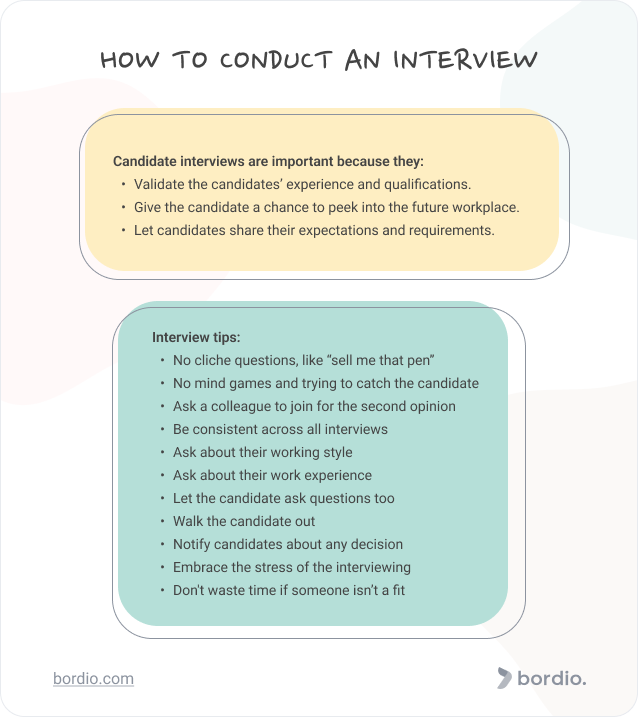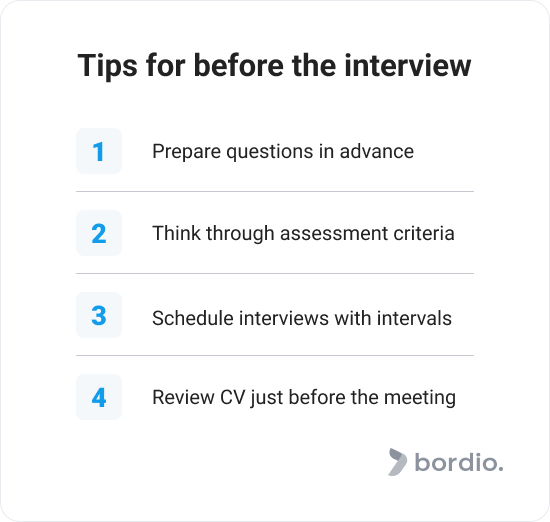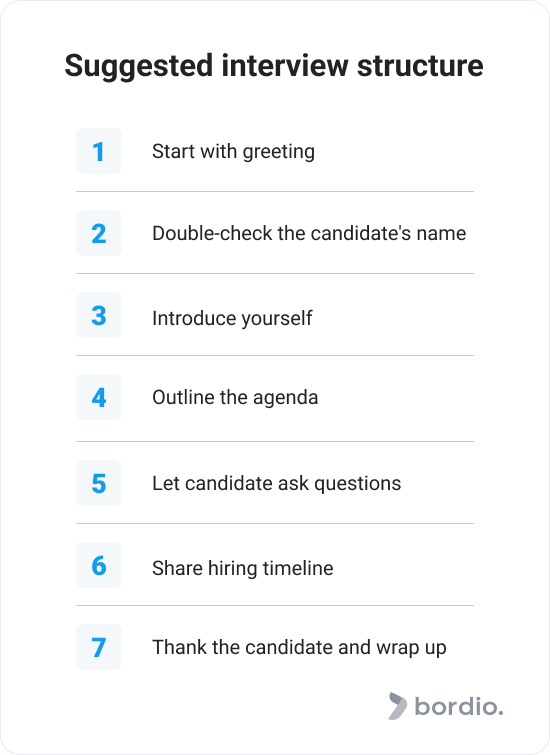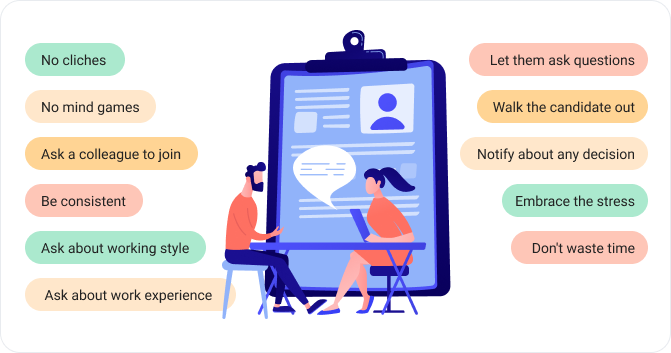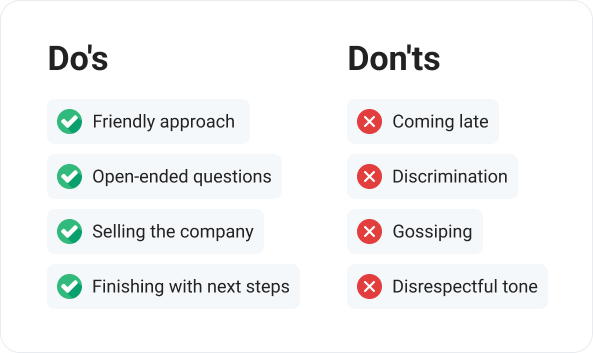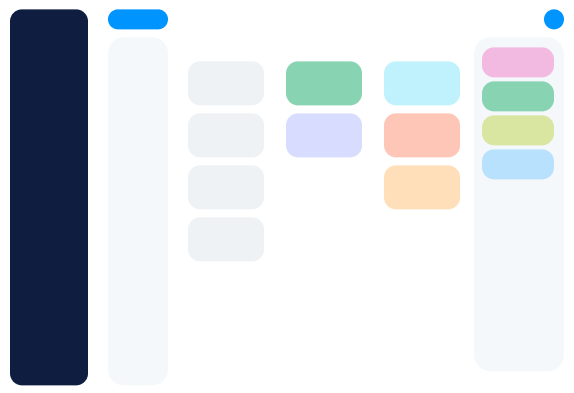Conducting interviews with candidates is an art form.
So much depends on the people you let on your team that the pressure is immense to find the right person and to find them fast.
Luckily, people have been conducting interviews for centuries now, slowly but surely perfecting the process and working out ways to make it efficient. And in today’s article, we want to share the key advice, little tips, dos and don’ts of interviewing, and everything in between.
By the end of reading this guide, you will have all the information you need to conduct your best interviews yet.
Tips for before the interview
Preparation is half of the success. Here’s what you can do before the interview.
Prepare the questions
Prepare and print out the questions for the interview in advance (you will find question examples further in the article). It’s better to conduct an interview when you have a paper list with questions in front of you, so you can increase the speed of writing down the candidate’s responses, and keep the natural conversation going.
Make sure you leave blank spaces after each question to be able to make notes and write down candidates’ answers during the interview. Include the title of the candidate, for example, Marketing Manager: Interview Questions + Candidate’s name with blank space: _________
Think about assessment criteria
What is important for this position? Include these criteria in your file to keep them in mind during the interview. Add the “Overall assessment” section that you will use to write final feedback after the interview.
Don’t schedule interviews without time intervals
You’ll need 10-15 minutes before the interview to prepare and 5-10 minutes after to finalize your thoughts. If you schedule interviews one after one without any breaks in your daily planner, you will be too exhausted to make the most of the interviews. So open your schedule calendar maker in advance and make a schedule more comfortable for you.
If you are constantly busy and feel like back-to-back interviews are your only option, try changing something about your daily work process. Implement a task prioritization system, learn about time management and the key tips it offers, than you can use it with tools for time management and read about productivity tips.
Have a brief look at the CV just before the interview
Open the candidate’s CV and test task and go through it 10 minutes before the interview begins. Highlight everything that you would like to discuss during the meeting.
Tips for during the interview
Don’t be late, but don’t wait for the candidate in the meeting room either. It’s better for the candidate to enter the room two minutes before the interview starts and wait for you. Set reminders in your time manager. Then you come in the right on time.
Suggested interview structure
- Start the job interview by greeting the candidate: “Hi John, nice to meet you! How are you doing today?” If it’s an offline interview, – “How did you get to our office?” One or two random questions in a nice form to reduce the pressure candidate is experiencing.
- If you are not sure how to pronounce their name, make it clear right at the beginning: “How do I pronounce your name correctly?” It would be weird if, by the end of the interview, you still don’t know that.
- Introduce yourself: “My name is Jacob. I’m the founder and CEO of Bordio.”
- Clarify the agenda and kick start with a short description of the position: “Today we are going to talk about the Marketing Manager position at Bordio. Because we are growing fast, we have more marketing-related tasks such as writing posts for Social Media, responding to comments, managing our PPC campaigns, and other relevant tasks. That’s why we are looking for another marketing manager to join our team and work in our team management system. So now I’m gonna ask you some questions about your skills and previous experience, and after that, you will be able to ask your questions, if you have any. Is that okay?” Then start with the questions you prepared in advance.
- Next, let the candidate ask their questions too. You’d want them to clarify as much about the position and the company as possible. Do your best to give them full answers.
- Share the hiring pipeline with the candidate. For example: “This week we have interview rounds with other candidates, and next week, we will choose the best candidate and make an offer.”
- Thank the candidate for their time: “Thank you for your time, John. We’ll be in touch soon.”
Tips for after the interview
After you say goodbye, go through all candidates’ answers and add anything that is missing.
Next, write a conclusion in your own words. It will help you remember how the interview went in two weeks when you will have to make a decision. For example: good candidate, relevant education, fluent in English, but no experience with X, Y. A little bit slow, takes their time to think.
Then write down your final conclusion – the overall candidate’s rating. For example, 8 out of 10. Or 6 out of 10. It will help you quickly identify the strongest and most qualified candidates after conducting 5-10 interviews.
Tips for conducting an interview like a pro
Interviews are nerve-wracking! And it is true for both candidates and interviewers alike. Use our tips to keep everything under control and stress-free during your next interviews.
1. Drop the embarrassing cliches
Take the time to study the candidate’s resume and prepare relevant questions to avoid the “sell me this pen” disaster when you run out of topics to speak about.
2. Leave the gotcha games behind
Stress interviews and other toxic hiring trends have no place in the modern workspace. A candidate should not go through an army-like stress test when coming for an interview in your company. What you really want is not to see them fail or “catch” them but to build rapport, get to know one another, and get a glimpse of your potential cooperation.
3. Have someone join you for an interview
Whenever possible, bring a colleague or one of the hiring managers with you to the interview to get someone else’s perspective on the candidate. It’s handy to have a second opinion because we might not notice important details for one reason or the other. Or, we might get the impression that another person would disagree. As a result, you’ll have a better-informed opinion of the candidate if you can discuss them with someone from your team.
4. Strive for consistency across all your interviews
Ideally, your interview process should repeat with every candidate. We’re not saying you should follow a script, but rather use a template. Why is that important? It will be easier for you to evaluate everyone and spot the best candidates and make the hiring decision if you go through the same topics and ask the same questions. Say, you are very fond of candidate A because of their problem-solving skills. But if you haven’t asked candidates B and C about their issue resolution experience, how would you know which one of them is the best fit?
5. Ask the candidate about their working style
Everyone asks about hard skills, and sometimes soft skills too, but often we fail to understand how the potential employee works. Are they fast-paced or enjoy taking their time to complete the task? Do they need to be surrounded by people, or do they flourish in a quiet, separated environment? Do they work with online calendar planners and to-do lists, or do they prefer to log everything in their paper notebook? What kind of free online schedule builder do they use? What kind of project management methodologies are they familiar with? Have they ever worked with online project management tools?
Tip: If candidates worked with less widespread methodologies, such as PRINCE2, but you work with Lean, make sure to ask more questions about that. Such candidates can be a bad hire if they can’t adapt, but they might also bring a unique perspective that will help you achieve the best results your company has ever had.
There are no right or wrong answers here in the grand scheme of things, but the person might not be a fit for your organization if everyone works like A and they prefer B. The sooner you find out, the better decision you both will be able to make. Company culture is far too important to ignore.
6. Ask thoughtful questions about previous work experience
Let’s say someone listed that they’ve managed a big project in their previous company. Dive deep into that experience with the candidate by asking them for specifics. What exactly was their role in the project? How were project meetings organized and structured? Ask them for insight about that type of work, how they feel about coordinating people and what helped them do that, etc. Basically, don’t settle for a high-level response but don’t be too investigative at the same time.
7. Always leave time for the candidates’ questions
And be prepared to answer them. In fact, encourage candidates to ask questions. Not only would it signal a candidate’s maturity, but you will also be able to learn more about them through what they find interesting and critical.
Pro tip: If you don’t know the answer to the candidates’ questions, simply say so. Also, let them know that you’ll get back to them with an answer and really do that.
8. Walk the candidate out
Final touch after the in-person interview – walk out your candidate. Yes, you are busy, and you don’t have to, but it will help the candidate remember you as thoughtful and nice. If you like the candidate – this gesture will give you extra points and make them more confident in accepting your job offer. If you don’t have the intention of hiring them, at least you’ll leave a good impression, and this person will likely talk about you as a nice company.
9. Make sure unsuccessful candidates hear from you
You should ALWAYS notify people that their application won’t be pursued. Not only is it required by etiquette, but it is paramount in building your reputation as a place to work. Every person has to be treated with respect regardless, especially if they have the potential to spread the word about just how awful you were with follow-ups. When sharing bad news, make the time to give details. Why is the candidate not considered further? What has put you off? Respectful and constructive feedback is welcome by most candidates because it gives them the opportunity to improve and understand the recruiter’s thinking process better.
10. Sometimes conducting interviews is stressful
Don’t be afraid. Remember that you are in charge here. Be confident. At the end of the day, the candidate can’t fire you, but you can offer them a job. You need to find the best possible employee/partner and your goal is to understand if this particular candidate is the best or not. That’s why you shouldn’t put them close together and allocate break time in your online task tracker.
11. If you see that the candidate is an obvious “No” – don’t waste everyone’s time
It’s better to tell the candidate the real reason and finish the interview early. For example: “John, I will be honest with you. I see that you don’t have experience with X technology, but this is essential for us. At this moment, we will not consider you for this position, so I don’t want to take any more of your time. I wish you to find an appropriate job as fast as possible!”
Tip: If you get several job seekers who are obviously not a good fit – have a look at the job descriptions your company is posting. Perhaps you are attracting the wrong crowd with your wording, and that can be easily fixed.
Questions to ask during the interview
Below is a list of questions that you are welcome to use during your own hiring process. Each of them serves a different purpose and helps understand the candidate quality from a new side. Don’t worry about using every single one of them during a single interview. Instead, go through them before you step into a meeting with a candidate, and try to use the relevant ones that fit nicely into the conversation.
- Was the job description clear for you? Do you have any questions about it?
- Why do you think you’re a good fit for this job? (Instead of “your strengths and weaknesses” questions)
- Is there anything specific that makes you interested in working for our company? What is drawing you towards that position?
- Could you walk us through an average day in your previous job?
- Let’s take a typical task A that you’d usually do at work. Say, you’re all finished with it and pretty sure that the outcome of your work is good. How would you approach critique on it, should your colleague or superior voice it?
- What were your most and least favorite aspects of the previous job?
- What do you know about our products/services?
- How does the position you’re applying for contribute towards your career goals?
- Have you ever worked remotely? If so, what were your challenges, and how did you resolve them? Have you used any time planner online or do you prefer paper counterparts.
- What tools have you used in your previous work? Any particular software or techniques that made you more efficient and productive? Did you use virtual planning at your last job.
- How would you rate the previous round of the interview process? (If that’s not the first interview, of course)
- If we make you an offer today, when will you be able to start?
And then there are non-standard questions that you can ask to get a feel for the candidate’s personality:
- If you could pick anyone in the world, who would you like to be your career mentor and why?
- How would you act if you found out your work friend did something unethical?
- What kind of people do you like to work with?
Questions you should NEVER ask during an interview
Not all questions are welcome. Some of them are discriminatory and illegal. Check with your lawyer and local governors for specific rules where you’re based.
And no matter where you work, do NOT ask job candidates about:
- Race
- Religion
- Gender
- Sexual preferences
- Marital status
- Nationality
- Age
If unsure whether your question is discriminatory, ask yourself: Does this have anything to do with the job? If not, or you’re not sure, – just don’t ask! Reach out to the hiring manager at your company for advice. They will be able to provide insights into the do’s and don’ts.
The role of the interviewer in the hiring process
Many hiring managers forget that an interviewer is like a salesperson, and the company is the product. Their main goal is to “sell” the idea of working in the company to quality candidates.
Besides that, they should communicate the following:
- What the job is actually like and what it consists of.
- More about the company itself and the industry it operates in.
- The skills (hard and soft) that are expected from a candidate.
- Salary and benefits (if you do that before the job offer is sent).
- Working conditions and perks.
The dos and don’ts of conducting an interview
The tips and questions we’ve shared will give you a good idea of what a strong interview would look like. However, we’d like to also outline the key dos and don’ts of the interviewing process in a brief and to-the-point manner. So, here they are.
The Dos of conducting an interview
Here is what every successful interview includes:
- Be friendly and build rapport.
- Gather information through open-ended questions.
- Sell your company and the job position.
- Close the interview with the next steps and walk the candidate out.
The Don’ts of conducting an interview
Below is the list of things that you should never do while interviewing candidates:
- Come to the interview late (as a power move or by mistake alike).
- Discriminate against the candidate’s sex, ethnicity, age, and anything else.
- Talk badly about colleagues and management.
- Talk down on candidates.
Why interviews are important
The candidate interview process is an essential part of the recruitment process. Here is why:
- Validates the candidates’ experience and qualifications.
- Gives the candidate a chance to peek into the future workplace.
- Lets candidates share their expectations and requirements.
Most of all, interviews allow interviewers and interviewees to get acquainted and get a feeling for what kind of work environment and vibes both parties can expect. Prepare for the interview in advance by scheduling everything in the daily schedule planner online.
So, go to an interview prepared but not stiff. Pay attention to details, but have fun too. And make sure all interviews are scheduled in your weekly planner by Bordio, so you’re always on time and ready.
Use our tips and you’ll be able to hire employees quickly. Good luck!

